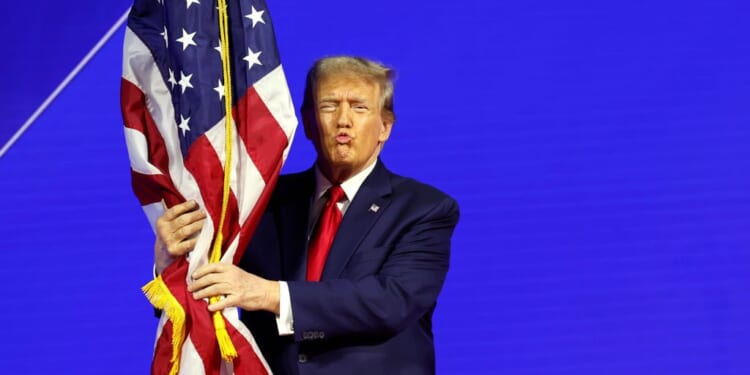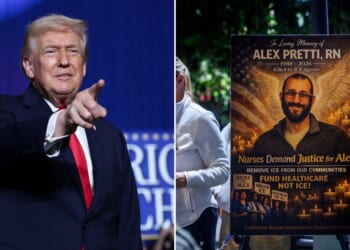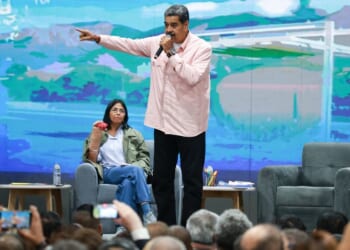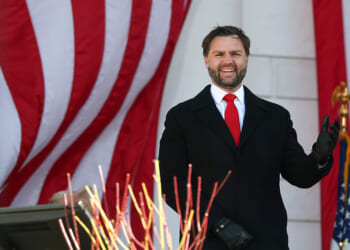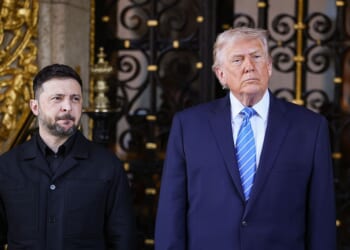When discussing Trump and interpreting what he might, or does, represent, we run into two problems. The first is that Trump’s recombination of ideas is not conventional and cannot be easily put into one ideologically recognisable box. Trump’s own volatility and knee-jerk reactions make classification even more difficult. The second problem derives from the interpreter’s side. We do not know what shape the successor order to neoliberal capitalism will take — it could go from neoliberal reinforcement, say “super neoliberalism”, to its total repudiation, passing through the most likely combination of parts from different ideologies — so that what might appear odd and unclassifiable in Trump may be due more to our unfamiliarity with the components of the new order. This problem is intensified by the absence of ideological preparation for the Trumpist order, such as happened before the neoliberal project became dominant: ideological preparations went back some 40 years before Thatcher and Reagan applied neoliberalism in practice. We do not, at least for now, see similar preparations having gone into Trumpism; though that might change in the future, as some of the intellectual antecedents to the ideas of the new order become more recognisable.
It is wrong, then, to link the shape of this future ideological project to Trump himself. His political future is uncertain. But the dissatisfaction, as well as a peculiar ideological mélange, that Trump defined is not going to go away: regardless of what happens to the man himself. Individuals certainly matter in history, but deep economic and political currents matter at least as much. After four years of Trump’s first presidency, policies that, in the beginning, appeared unusual, have been adopted by the rest of the body politic. They remained, and were even developed, after his first term. Thus the new political and economic order is already here. Trump’s second administration is continuing along the same path, and even accelerating the change.
When Trump waged a trade war with China in 2017, it was an unusual idea with very little prior support from the political class. It has since become more broadly defined, more elaborate in content, and accepted across the entire American, and increasingly European, political spectrum. It has an economic component (China is responsible for the decline of the American middle classes), a military interest (US security in Asia is jeopardised by China’s rise), and a political agenda (China is run by a dictatorial regime). The last two parts were “developed” after Trump left office in 2021, a further confirmation of the near-universal acceptance of this new thinking.
Recourse to trade wars or sanctions of individual entities or persons expanded under Trump — for instance, the reintroduction of a tough sanction regime against Cuba, increased sanctions against Iran and Venezuela — but that policy was not discontinued under President Biden. In fact, nothing changed either in policies with respect to Cuba, Iran and Venezuela, while a multitude of new sanctions were introduced against Russia, China, North Korea, Yemen and other nations. The United States has dozens of sanction regimes that affect perhaps thousands of individuals. Economic coercion is now considered a normal part of the international economic policy toolkit.
The mercantilist approach to foreign trade, and the view of markets as solely the terrains of contestation and combat, is something that we can define as a “businessman” view of economics: it sees economic activity as a permanent struggle; and does not see the “invisible hand” of the market that reconciles various interests. The businessman view is now much more widely shared than a decade ago. The influential Financial Times commentator and writer Rana Foroohar gave it a veneer of respectability in her 2022 book Homecoming; new mercantilism is promoted by influential circles in the United States and the European Union, often under the guise of the need for greater geopolitical or military security.
Bradford DeLong, a former US undersecretary of the Treasury under Bill Clinton, has come out defending industrial policies on the basis of national security, even using, out of context, Adam Smith’s statement that “defence is much more important than opulence”. “Friend-shoring” favours investments in politically friendly countries and de facto divides the world into competing trade blocs, not different in any essential way from the division of the world into economic blocs that reached its peak in the interwar period. “Friend-shoring” is the Imperial Preference or Japan’s Co-Prosperity Sphere that dares not speak its name.
What people who are arguing for such policies forget is that the 180-degree turn in Western policies regarding protectionism, trade blocs, industrial policy and economic coercion has international consequences. The entire post-1945 system of Bretton Woods institutions was set around the principles of free trade. Until the massive trade liberalisations in 1980, it did not exclude the use of tariffs and other protective measures: but this had to be done within an international framework (first GATT, then the WTO). With the ascendancy of the Washington Consensus, economic policies became further liberalised. It will therefore be difficult, if not impossible, to explain to the rest of the world that the entire post-1945 system ought to be revised. Should, for example, the World Bank suggest to Nigeria that it should increase tariffs and join a trade bloc?
Or, to put it differently, if a country does exactly that and the World Bank still argues for trade liberalisation, how seriously can the World Bank argue for it while the US and Europe are raising tariffs and creating trade blocs? Given the pre-eminent importance of the political West in the design and running of international organisations, these changes cannot be looked at solely from the domestic angle, as if the previous neoliberal policies can be continued in other countries as before. The change in trade policies among the most powerful countries will inevitably have repercussions for the rest of the world, not only economically but also ideologically. One would need to define a new global paradigm for international organisations like the World Bank and the IMF. The idea, and execution, of limiting immigration and increasing deportation is not exclusive to Trump. But by speaking about it ceaselessly, he has made it enter the political lexicon. The wall against Mexico continued to be built after Trump left office the first time, while children were still held in cages.
Now, “walling oneself off” from the rest of the world has become a politically acceptable approach globally. EU boats patrol the Mediterranean, where about 3,000 people die annually while trying to cross to Europe (the statistics are intentionally vague). Walls against immigrants have also been erected on the Greco-Turkish and Serbo-Hungarian borders. The EU’s approach is uniquely schizophrenic: it prides itself on being a multicultural and multinational union, but holds it acceptable to build walls and electric fences on its borders. Trump’s anti-immigration stance has not differed from that of Theresa May when she was the home secretary and prime minister in the UK or, Giorgia Meloni in Italy (who is building camps in Albania for immigrants imprisoned by Italian authorities similar to the El Salvador prisons used by the Trump administration).
“The EU’s approach is uniquely schizophrenic.”
Trump’s ethnonationalism, that in the US means anti-black and anti-Latino policies, is shared, as against “their” minorities, by numerous European political parties, from the Finns Party in Finland to the Freedom Party in the Netherlands, Le Pen’s Rassemblement National in France and Vox in Spain. It is when we put these ideas together — tariff wars; sanctions as a way to conduct economic policy; trade blocs; halts to immigration — that we can better appreciate that the new ideological package “proposed” by Trump is not just his own but is similar or the same as the “packages” already applied by many in the political West. And these “many” are not just the so-called populist parties: smaller or larger parts of the “package” have been appropriated by the mainstream parties too.
A new set of political beliefs, unrelated to whether Trump is in power or not, has been created, and is likely to remain long after he is gone. One can see this clearly by listing four areas that are each in direct opposition to neoliberal ideas. First: instead of globalisation, there are tariff wars and economic exclusion zones. Second: instead of economics being insulated from politics, there are politically motivated sanctions and state-led industrial policies. Third: instead of the aspiration to full mobility of people around the world, there are walls and fences. Fourth: instead of cosmopolitanism, as a desired ideology, there are openly nationalistic movements in positions of power.
There are also elements of neoliberalism that are likely to survive under this new ideological amalgam. It is, in Trump’s case, as already mentioned, a businessman’s approach to neoliberalism. It nevertheless has commonalities with standard neoliberalism: low taxation of high incomes and inheritance; tax preference given to incomes from capital vs incomes from labour; deregulation; limited state spending; no government interference in private matters (including rejection of affirmative action, gender-related policies and other attempts to level the playing field between different groups).
The term that might be the most appropriate for this amalgam of ideas is “national market liberalism”. It includes parts of both classical liberal and neoliberal thinking when it comes to markets, but it rejects — or is at least sceptical of — other parts of the liberal project around civil equality. Further, it rejects the internationalism that was integral to both classical liberalism and neoliberalism. Hence, the “national”, a prefix I think indispensable. It may be deemed inconsistent to append the term “nationalist” to an ideology that was famously universalist, in favour of free global movement of goods, people, capital and technology. Quinn Slobodian, in his excellent book Globalists: The End of Empire and the Birth of Neoliberalism, traces the evolution of neoliberal thinking, and notes the distinction that its founders made — once they realised that the dream of a global neoliberal political federation is not achievable — between “imperium” that deals with political, cultural and symbolic matters, and “dominium”, an internationally regulated economic system within which the symbolic “imperium” is encased. The dominium ensured not only free movement of factors of production and goods and services, but also monetary stability and compatibility of legal norms. Liberals as well as neoliberals were always cosmopolitan or internationalist; their ambitions were not limited to one or two countries. The world as envisaged by fellow-Austrian political economists Ludwig von Mises and Friedrich Hayek was a borderless world. This is, as we have seen above, very far from the ideas that Trump and other challengers to neoliberalism have in mind.
The ideological amalgam that combines “national” with an ideology that is fundamentally internationalist is not a novelty. National socialism put together, not only in words, but in deed, the two elements that were considered incompatible: socialism, that was always internationalist, and nationalism. National Socialism proved that such a combination was possible and enjoyed enormous political success. Stalin’s “socialism in one country” can also be placed in the same group of systems. There, however, a communist party jettisoned internationalism and adopted Russian, or probably more exactly Soviet, nationalism. Domestically, though, it remained socialist.
Socialism shorn of its internationalist component produced national socialism in its Hitlerite and Stalinist versions. Global neoliberalism shorn of its internationalist component gives us a vision of the new emerging consensus: liberal policies limited to national markets and mercantilism abroad. This also, I believe, convincingly proves that the critics of the new consensus are wrong to call it “fascist”. Yes, it shares a nationalistic element with “fascism”, but not more so than mercantilist policies in general. Domestically, though, it eschews any socialistic element — nay, it explicitly rejects them — and in that respect it comes close to, or is indistinguishable from, neoliberalism.
***
This is an edited excerpt from The Great Global Transformation, which is published by Allen Lane on 6 November.

